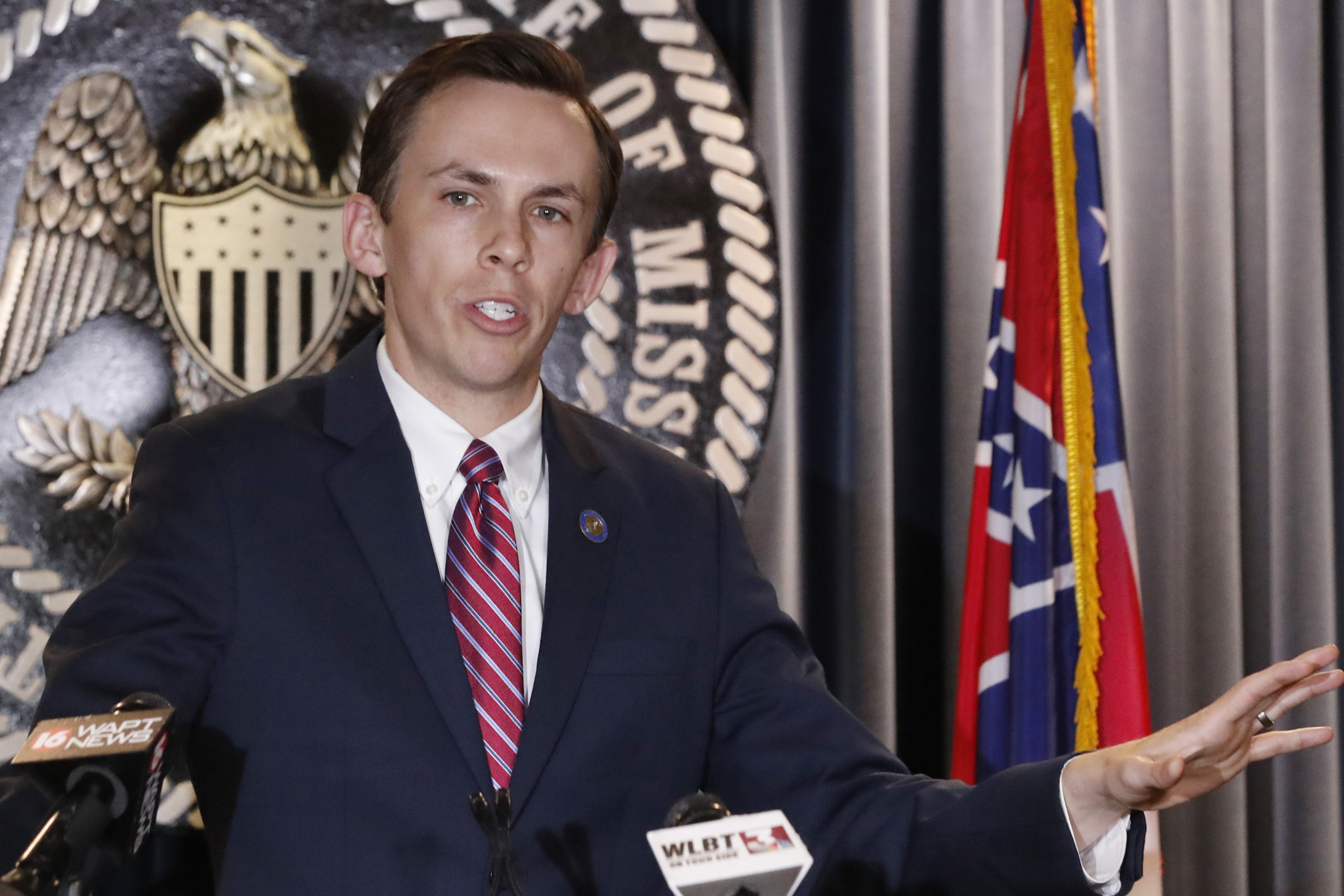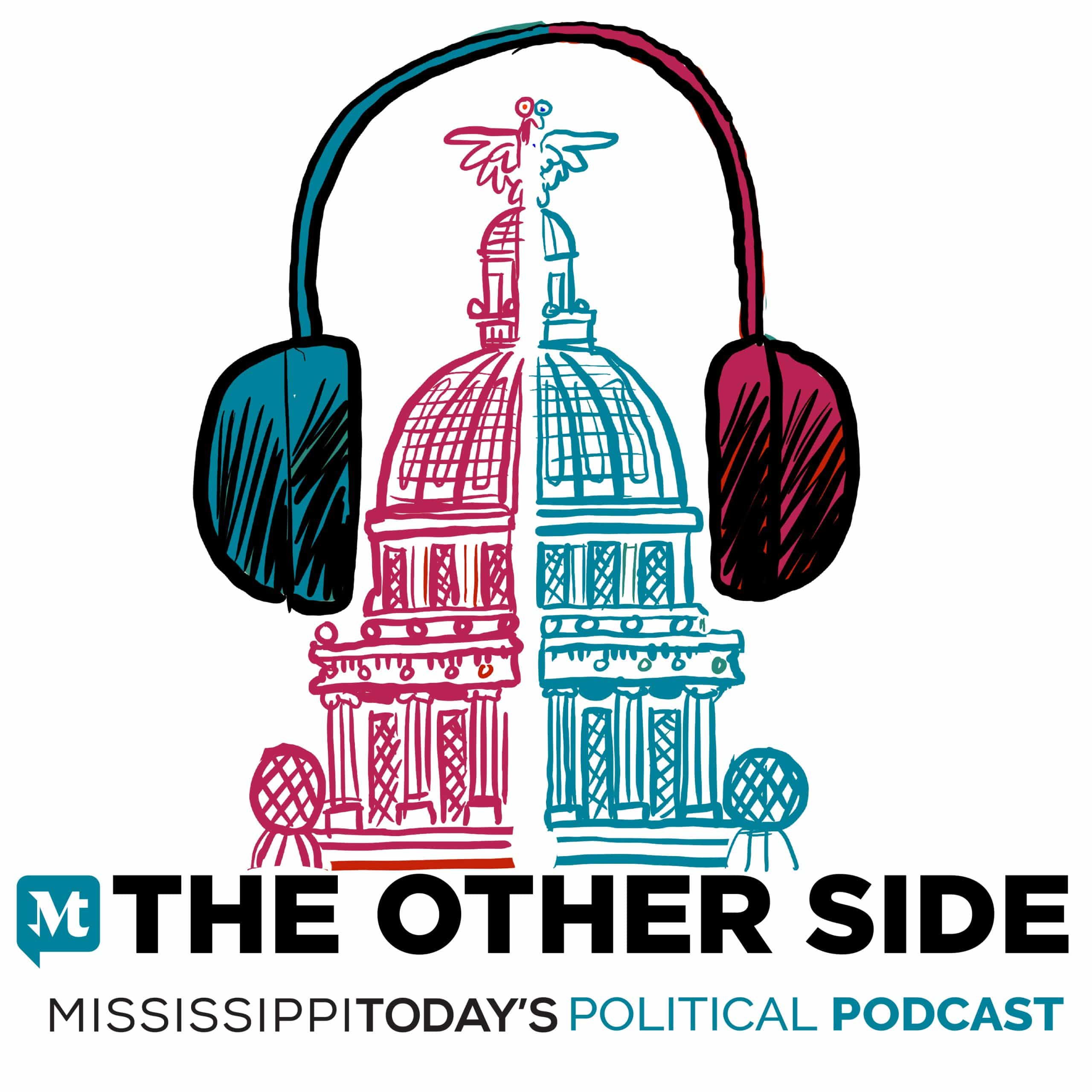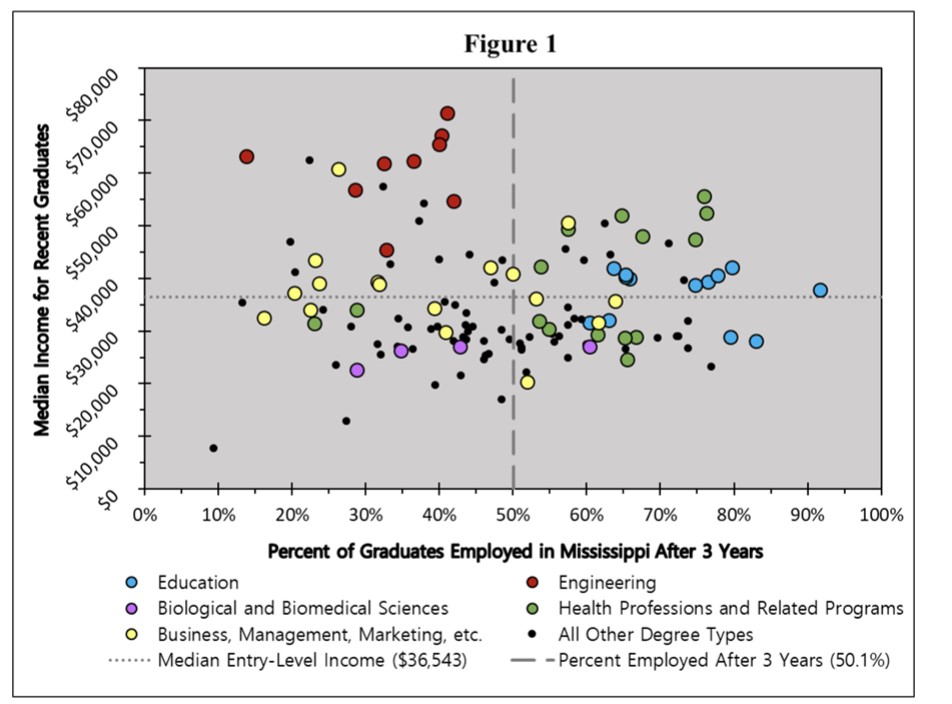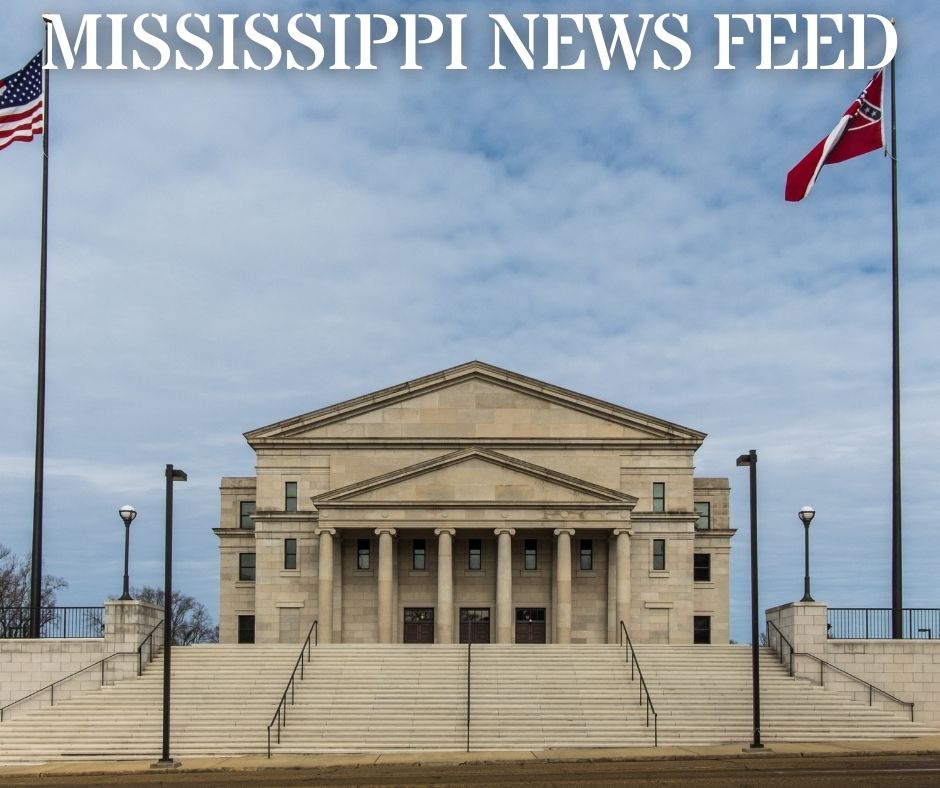Mississippi Today
Auditor’s proposal to defund some college majors catches fire online, but are lawmakers interested?

Buoyed by a series of tweets from State Auditor Shad White belittling certain liberal arts degrees as “garbage,” “useless” and “indoctrination factories,” a recent report from his office calls for Mississippi to change how it funds higher education by stripping public money from programs that don't support the state's economy in favor of those that do.
But in an interview Friday afternoon, two days after the report was released, White said he could not think of any lawmakers who had reached out to him about setting up a committee — the report's central recommendation — to study revamping higher education funding in Mississippi.
“I'm wracking my brain,” he said. “Not a ton (have reached out) because it's just been out for two or three days.”
White said he expects some inquiries but his guess is that hard copies of the report, which were prepped for a number of powerful elected officials — the governor, the lieutenant governor, the speaker of the house and members of key legislative committees — haven't arrived in the mail yet.
The state auditor's office does not have policy-making power, so for now, White is reliant on champion lawmakers to turn his recommendations into reality.
“I'm trying to think if a legislator has texted or called me,” White said. “I don't recall any right offhand that specifically mentioned the report.”
The eight-page report is part of a yearlong effort by the auditor's office to propose solutions to Mississippi's intractable “brain drain,” the phenomenon in which college-educated people leave the state for better-paying opportunities elsewhere, in effect subsidizing the economy's of nearby states.
If Mississippi could retain just a few more graduates seeking highly paid jobs like engineering, the report said it would be a multimillion-dollar boon to the economy.
“State appropriations should focus on the degree programs our state's economy values most,” the report states. “Otherwise, taxpayers will face the repercussions of an inadequate workforce and a declining population.”
The brain drain is an issue that has concerned lawmakers across the political spectrum and, in recent years, led to bipartisan proposals in Mississippi to incentivize graduates to go into crucial fields, like teaching and nursing, that are experiencing dire shortages.
State agencies already have some policies that take this into account. The Institutions of Higher Learning, which oversees public universities in Mississippi, evaluates programs based on the state's workforce needs. The state's community colleges are trying to expand workforce development programs.
What White is proposing goes further. Though he is not advocating for “abolishing” certain degrees, White said it's not enough to simply let the market guide Mississippi college students to degrees that lead to higher-paying jobs — which, by and large, is what's already happening.
Rather, state government intervention is necessary to ensure taxpayers are seeing a return on investment in higher education, White said.
“What I'm suggesting is that we take a hard look at how we're spending money, and we add more money to those programs of study,” he said, “by … taking those dollars away from programs of study that aren't economically beneficial to taxpayers.”
Toren Ballard, an education policy analyst at Mississippi First, said it's important to understand that taxpayers are not really footing the bill for the state's universities. This year, state appropriations comprised just 21.5% of IHL's operating budget.
As state funding for higher education has plummeted since 2000, the cost of tuition has ballooned, putting the onus on Mississippians to pay for college, leading them to choose career paths that help them afford it, Ballard said. That's one reason he thinks the report's recommendation is largely unnecessary, though he hopes it could lead to more funding for higher education.
“I think we're not giving enough credit to individual student decision making here,” Ballard said.
Al Rankins, the IHL commissioner, seemed to agree. In a statement, he said it would “appear more productive” to address Mississippi's brain drain by creating more career opportunities.
“University students are adults who choose their majors based on their interests and career aspirations,” he said. “After graduating some choose to pursue opportunities in other states for a myriad of reasons outside of the control of our universities.”
White said that when he was choosing his undergraduate major — political science and economics from the University of Mississippi — that he wished he had access to data showing what he could expect to make when he graduates.
“If I had to think it over again, I would rethink majoring in political science,” he said.
So what degree programs does Mississippi's economy value most, according to the auditor? The report begins with a graph that measures value as a trade-off between the median income a graduate can expect to make and the likelihood they will stay in Mississippi.
In the top-left corner of the graph are higher-paid graduates who are more likely to leave, like business and engineering degrees. The top-right corner shows higher-paid graduates who were very likely to stay, including health professions and teachers. “All other degree types” are largely in the middle.
Right now, the report says, the state funds all those degrees at the same amount, even though some degrees cost more to offer.
Ballard noted the report did not consider graduates who go directly to law school or medical school, potentially lowering the median income of majors like sociology that the auditor denigrated online.
“That's why engineering degrees look particularly good here,” he said.
White said the goal of the report — and his social media posts — was not to be comprehensive but to “initiate a conversation around this question.”
But that doesn't mean he's taking back anything he wrote.
“I'm defending it,” he said. “I'm telling you that we have to address these ideas in a way that is plain and clear, and if you shroud it in technocratic jargon, nobody will care.”
This article first appeared on Mississippi Today and is republished here under a Creative Commons license.
Did you miss our previous article…
https://www.biloxinewsevents.com/?p=290146
Mississippi Today
Podcast: The controversial day that Robert Kennedy came to the University of Mississippi

Retired U.S. Bankruptcy Judge Edward Ellington talks with Mississippi Today's Bobby Harrison and Geoff Pender about former U.S. Attorney General Robert Kennedy's speech at the University of Mississippi less than four years after the riots that occurred after the integration of the school. Ellington, who at the time headed the Ole Miss Speaker's Bureau as a law school student, recalls the controversy leading up to the speech.
This article first appeared on Mississippi Today and is republished here under a Creative Commons license.
Did you miss our previous article…
https://www.biloxinewsevents.com/?p=359978
Mississippi Today
On this day in 1961
MAY 20, 1961

A white mob of more than 300, including Klansmen, attacked Freedom Riders at the Greyhound Bus Station in Montgomery, Alabama. Future Congressman John Lewis was among them.
“An angry mob came out of nowhere, hundreds of people, with bricks and balls, chains,” Lewis recalled.
After beating on the riders, the mob turned on reporters and then Justice Department official John Seigenthaler, who was beaten unconscious and left in the street after helping two riders.
“Then they turned on my colleagues and started beating us and beat us so severely, we were left bloodied and unconscious in the streets of Montgomery,” Lewis recalled.
As the mob headed his way, Freedom Rider James Zwerg said he asked for God to be with him, and “I felt absolutely surrounded by love. I knew that whether I lived or died, I was going to be OK.”
The mob beat him so badly that his suit was soaked in blood.
“There was nothing particularly heroic in what I did,” he said. “If you want to talk about heroism, consider the Black man who probably saved my life. This man in coveralls, just off of work, happened to walk by as my beating was going on and said ‘Stop beating that kid. If you want to beat someone, beat me.' And they did. He was still unconscious when I left the hospital.”
To quell the violence, Attorney General Robert Kennedy sent in 450 federal marshals.
This article first appeared on Mississippi Today and is republished here under a Creative Commons license.
Mississippi Today
2024 Mississippi legislative session not good for private school voucher supporters
Despite a recent Mississippi Supreme Court ruling allowing $10 million in public money to be spent on private schools, 2024 has not been a good year for those supporting school vouchers.
School-choice supporters were hopeful during the 2024 legislative session, with new House Speaker Jason White at times indicating support for vouchers.
But the Legislature, which recently completed its session, did not pass any new voucher bills. In fact, it placed tighter restrictions on some of the limited laws the state has in place allowing public money to be spent on private schools.
Notably, the Legislature passed a bill that provides significantly more oversight of a program that provides a limited number of scholarships or vouchers for special-needs children to attend private schools.
Going forward, thanks to the new law, to receive the vouchers a parent must certify that their child will be attending a private school that offers the special needs educational services that will help the child. And the school must report information on the academic progress of the child receiving the funds.
Also, efforts to expand another state program that provides tax credits for the benefit of private schools was defeated. Legislation that would have expanded the tax credits offered by the Children's Promise Act from $8 million a year to $24 million to benefit private schools was defeated. Private schools are supposed to educate low income students and students with special needs to receive the benefit of the tax credits. The legislation expanding the Children's Promise Act was defeated after it was reported that no state agency knew how many students who fit into the categories of poverty and other specific needs were being educated in the schools receiving funds through the tax credits.
Interestingly, the Legislature did not expand the Children's Promise Act but also did not place more oversight on the private schools receiving the tax credit funds.
The bright spot for those supporting vouchers was the early May state Supreme Court ruling. But, in reality, the Supreme Court ruling was not as good for supporters of vouchers as it might appear on the surface.
The Supreme Court did not say in the ruling whether school vouchers are constitutional. Instead, the state's highest court ruled that the group that brought the lawsuit – Parents for Public Schools – did not have standing to pursue the legal action.
The Supreme Court justices did not give any indication that they were ready to say they were going to ignore the Mississippi Constitution's plain language that prohibits public funds from being provided “to any school that at the time of receiving such appropriation is not conducted as a free school.”
In addition to finding Parents for Public Schools did not have standing to bring the lawsuit, the court said another key reason for its ruling was the fact that the funds the private schools were receiving were federal, not state funds. The public funds at the center of the lawsuit were federal COVID-19 relief dollars.
Right or wrong, The court appeared to make a distinction between federal money and state general funds. And in reality, the circumstances are unique in that seldom does the state receive federal money with so few strings attached that it can be awarded to private schools.
The majority opinion written by Northern District Supreme Justice Robert Chamberlin and joined by six justices states, “These specific federal funds were never earmarked by either the federal government or the state for educational purposes, have not been commingled with state education funds, are not for educational purposes and therefore cannot be said to have harmed PPS (Parents for Public Schools) by taking finite government educational funding away from public schools.”
And Southern District Supreme Court Justice Dawn Beam, who joined the majority opinion, wrote separately “ to reiterate that we are not ruling on state funds but American Rescue Plan Act (ARPA) funds … The ARPA funds were given to the state to be used in four possible ways, three of which were directly related to the COVID -19 health emergency and one of which was to make necessary investments in water, sewer or broadband infrastructure.”
Granted, many public school advocates lamented the decision, pointing out that federal funds are indeed public or taxpayer money and those federal funds could have been used to help struggling public schools.
Two justices – James Kitchens and Leslie King, both of the Central District, agreed with that argument.
But, importantly, a decidedly conservative-leaning Mississippi Supreme Court stopped far short – at least for the time being – of circumventing state constitutional language that plainly states that public funds are not to go to private schools.
And a decidedly conservative Mississippi Legislature chose not to expand voucher programs during the 2024 session.
This article first appeared on Mississippi Today and is republished here under a Creative Commons license.
-
Our Mississippi Home6 days ago
Beat the Heat with Mississippi’s Best Waterparks
-
SuperTalk FM3 days ago
State auditor cracking down on Mississippians receiving unemployment benefits
-
Kaiser Health News6 days ago
Medicaid ‘Unwinding’ Decried as Biased Against Disabled People
-
Mississippi News Video5 days ago
Jackson has a gang problem
-
Local News3 days ago
Family files lawsuit after teen’s suicide in Harrison County Jail
-
Mississippi Today4 days ago
On this day in 1950
-
228Sports6 days ago
George County Pours Runs In 6A South State Title Victory At PRC
-
Our Mississippi Home2 days ago
Deer Fly Season on the Coast – Oh My!










































